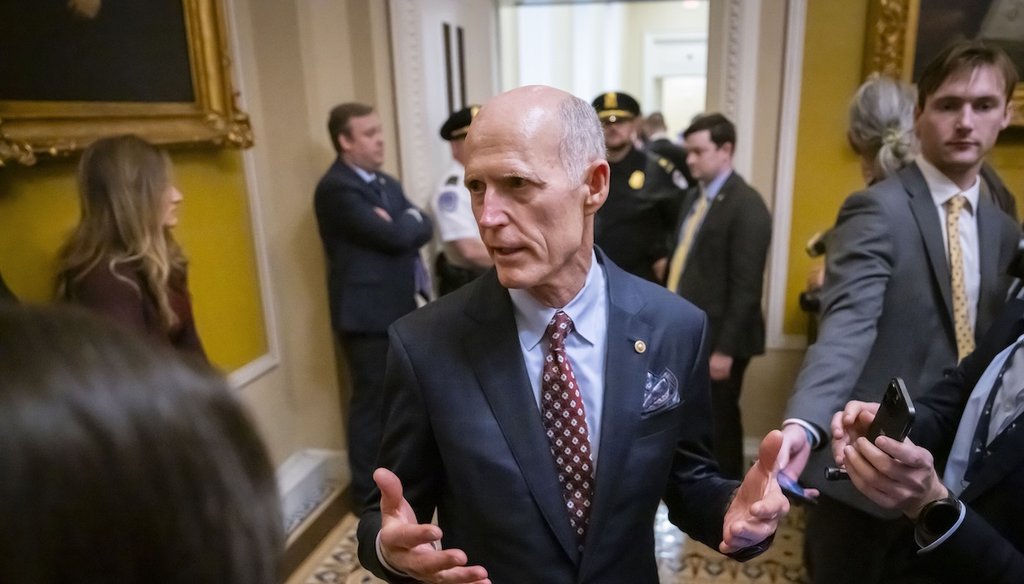

Our only agenda is to publish the truth so you can be an informed participant in democracy.
We need your help.


Sen. Rick Scott, R-Fla., speaks to reporters after Senate Republicans met with Elon Musk at the Capitol on March 5, 2025. (AP)
Whether counting from the beginning of former President Joe Biden’s term or from June 2022, when U.S. employment returned to its prepandemic level, the number of full-time jobs increased on Biden’s watch.
The number of part-time jobs also rose during Biden’s tenure, largely driven by an increase in workers who chose part-time work because they preferred it.
Sen. Rick Scott, R-Fla., blamed recent economic turbulence — a falling stock market, declining consumer confidence and uncertainty from on-again, off-again tariffs — on President Donald Trump’s predecessor.
On CNN’s "State of the Union" on March 9, host Jake Tapper asked Scott, "President Trump has acknowledged that there's going to be a little disturbance due to his economic policies. How bad is this disturbance going to be and how long is it going to last?"
Scott responded, "Well, first off, Donald Trump walked in with a crappy economy. The number of full-time jobs has been dropping almost the entire Biden administration."
Scott is wrong about the full-time employment trends under Biden. Full-time jobs increased during Biden’s tenure. Part-time jobs increased, too, driven by people who wanted to work part-time.
Scott’s office did not respond to an inquiry for this article.
When it comes to full-time employment, Bureau of Labor Statistics data shows that the number of jobs rose from 125.2 million in January 2021, Biden’s first month in office, to 133.5 million in December 2024, his final full month in office. That’s an increase of 8.3 million jobs, or about 6.6%, over four years.
An alternate way of examining the data is to start counting in June 2022, when the U.S. returned to its prepandemic employment level. This doesn’t include employees who returned to jobs once pandemic conditions improved.
Starting the count in June 2022 still shows an increase, though a more modest one: 998,000 jobs, or about 0.8%.
Part-time jobs also rose during Biden’s tenure.
The Bureau of Labor Statistics tracks two part-time jobs statistics: one for overall numbers and another that counts part-time jobs "for economic reasons." The latter category counts people who are working part-time because of "unfavorable business conditions, inability to find full-time work, and seasonal declines in demand." People in this category have told survey-takers that they prefer full-time work and would be available to take it.
A rise in the number of people working part-time for economic reasons is considered worrisome for the economy, but a rise in people working part-time for noneconomic reasons isn’t.
That’s because many of these people are working part-time by choice. In many cases, they are students, parents of young children, retirees or people seeking a certain lifestyle.
"In my research, we consistently find that the voluntary part-time workers report higher health, happiness with work and satisfaction with work schedules than both full-time workers and people working part-time for economic reasons," Lonnie Golden, a Penn State University economist, told PolitiFact last year. "That's a good thing."
Under Biden, the growth in part-time work was driven by people working part-time by choice, not because they couldn’t find full-time jobs.
The number of Americans working part-time for economic reasons accounts for a small fraction of all part-time workers, and the share of all part-time workers compared with all workers is also small. Regardless, these shares declined over the course of Biden’s term.
Scott said, "The number of full-time jobs has been dropping almost the entire Biden administration."
Whether counting from the beginning of Biden’s term or from June 2022, when U.S. employment returned to its prepandemic level, full time jobs increased on Biden’s watch.
Part-time jobs also increased, largely driven by an increase in the number of workers who chose part-time work because they preferred it to full-time work, not because they tried and failed to find full-time jobs.
We rate the statement False.
Rick Scott, interview on CNN’s "State of the Union," March 9, 2025
Federal Reserve Bank of St. Louis, "Employed, Usually Work Full Time," accessed March 10, 2025
Federal Reserve Bank of St. Louis, "Employed, Usually Work Part Time," accessed March 10, 2025
Federal Reserve Bank of St. Louis, "Employment Level - Part-Time for Economic Reasons, All Industries," accessed March 10, 2025
Bureau of Labor Statistics, glossary, accessed March 10, 2025
PolitiFact, "Was last year's US job growth all from part-time jobs? Why RFK Jr.’s claim is Half True," April 26, 2024
In a world of wild talk and fake news, help us stand up for the facts.
